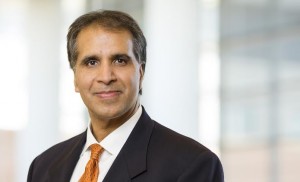First Monday Musings By Dean Vik Amar: Why We In Legal Academia Should Assist In Legal Journalism, But Do So Carefully
Legal academics can and should help educate the public about the law.
 As a dean, and as someone who has been a law professor for over two decades, I am often asked by more junior legal academics and administrators — at my own law school and elsewhere — whether it is a good idea for law professors and lecturers to engage with the media by giving interviews, penning op-eds, writing lay-accessible columns and blogs for legal websites, etc. My answer is a qualified yes. I will explain three of my qualifications below, but first let me offer two framing observations, one general and the other personal.
As a dean, and as someone who has been a law professor for over two decades, I am often asked by more junior legal academics and administrators — at my own law school and elsewhere — whether it is a good idea for law professors and lecturers to engage with the media by giving interviews, penning op-eds, writing lay-accessible columns and blogs for legal websites, etc. My answer is a qualified yes. I will explain three of my qualifications below, but first let me offer two framing observations, one general and the other personal.
As a general matter, I think it hard to deny that the quality of mainstream journalism — including coverage of legal matters — has suffered, simply because it is harder for talented people to make a living as a journalist. You don’t have to be an adherent of Milton Friedman to acknowledge that financial incentives matter, and that when organizations lose revenue, recruiting talented people becomes harder. That is where legal academics can and should step in. We get paid well (relatively speaking) and (notwithstanding our gripes) have time to devote to civic engagement. Even if it weren’t part of our service mission (along with scholarship and teaching) to assist not just the profession but also the public (which I think it is, even at private law schools), we ought to step in simply because we are needed.
My personal observation is that in my own career I think I have benefitted tremendously from connecting with print and electronic media (both nationally and locally), from regularly running op-eds in broadly distributed newspapers, and from writing my biweekly online column (mostly on constitutional matters) — first for findlaw.com and now for justia.com — for almost two decades. One concern people raise is whether such activities are a distraction from the research and teaching that are the primary professional responsibilities of a law professor. For me, just the opposite. Quite often, I use shorter, lay-friendly essays and media interviews to explain ideas I have already developed in more depth in academic literature or, more exciting still, to begin to explore the contours of ideas that I have been thinking about and that I plan on examining in more depth in future scholarly work. And I often use (and assign) my essays (or interview segments) in my classroom teaching, helping students appreciate and evaluate the application of legal theories to important topics drawn from the headlines.

AI Presents Both Opportunities And Risks For Lawyers. Are You Prepared?
But that leads me to my first qualification/piece of advice: stick to subject matters you have thought about for some time while wearing your academic hat. As with practicing lawyers, the most important asset legal academics possess is their credibility. And other legal academics will judge you if you weigh in on topics in such a way as to demonstrate you really haven’t thought through all the important considerations and counterarguments. Perhaps one doesn’t have to be a separation-of-powers guru to have something helpful to add about the relationship between the White House and the Department of Justice. But, for instance, if one is going to blithely reject the unitary executive theory (under which the President is investigator- and prosecutor-in-chief), one should at least know what the leading scholarship says, and the direction in which the Supreme Court might be moving. (Another example: even though I am a pretty broad constitutional generalist and have written on many, many constitutional provisions, I resisted answering any media queries about President Trump and the Emoluments Clause, simply because I had never given it any sustained academic thought in the past, and I didn’t think a few hours of poking around would make my observations worth considering.)
My second suggestion is a modest, seemingly technical one that in some respects follows from the credibility idea I just mentioned: always make sure (especially if you are early in your career and don’t have tenure or similar job protections) that the media uses your correct title in any attributions. If you are an Adjunct Professor and are referred merely as a “Professor” in an interview that some members of the full-time faculty didn’t like, some will notice and care that you weren’t properly identified. Sometimes this reflects petty resentment, but sometimes there is a reason behind the desire for clear identification. I remember when I was a law student at Yale one of the Assistant Deans did an interview on a very prominent nationally syndicated talk show on a controversial topic. And the producers of the show (either carelessly or intentionally) listed this person’s title on the TV screen as “Dean, Yale Law School.” I know that our Dean, Guido Calabresi, was the kind of guy so gracious as to not feel slighted. But viewers were misled, and to the extent that many folks found the Assistant Dean’s legal assertions to be questionable, this misattribution was something about which the law school and its faculty might care. Most of the time, these mislabelings are the media’s fault, but that doesn’t mean that we, as the individuals misidentified, are spared the negative reaction by a legal academic profession that is — let’s face it — often overly judgmental and quite nit-picky.
My final suggestion also relates to credibility, but in a slightly different way. Many of the lay essays by legal academics I read do not seem particularly lawyerly. By that I mean that they are not written with an eye towards convincing people whose minds are not already made up (which is what we, I hope, are trying to train our law students to do), but instead seem like cheerleading for a cause. We live in a society where cheerleading has its important place, but as trained legal professionals we are in a position to credibly analyze, critique and rebut arguments so as to win people over, not just comfort folks who already agree with us. That is a public service function we are distinctively able to discharge, and it seems a shame if we don’t try to take advantage of our professional training and skills to do so.
Ed. note: As reflected in its title, Dean Amar’s column generally appears on the first Monday of each month, but because yesterday was Labor Day, we are running his column today.
Sponsored

Happy Lawyers, Better Results The Key To Thriving In Tough Times

Law Firm Business Development Is More Than Relationship Building

AI Presents Both Opportunities And Risks For Lawyers. Are You Prepared?

Curbing Client And Talent Loss With Productivity Tech
 Vikram Amar is the Dean of the University of Illinois College of Law, where he also serves the Iwan Foundation Professor of Law. His primary fields of teaching and study are constitutional law, federal courts, and civil and criminal procedure. A fuller bio and CV can be found at https://www.law.illinois.edu/faculty/profile/VikramAmar, and he can be reached at [email protected].
Vikram Amar is the Dean of the University of Illinois College of Law, where he also serves the Iwan Foundation Professor of Law. His primary fields of teaching and study are constitutional law, federal courts, and civil and criminal procedure. A fuller bio and CV can be found at https://www.law.illinois.edu/faculty/profile/VikramAmar, and he can be reached at [email protected].
Sponsored

How The New Lexis+ AI App Empowers Lawyers On The Go








